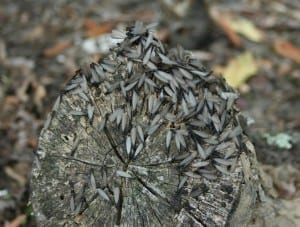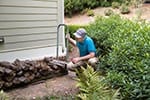Author: Jeffery Preece, BCE. Board Certified Entomologist 03/19/2018
The Spring and Termites How are they related
 The Spring and Termites How are they related. Spring is just around the corner and the first signs of termites will soon be evident. Be on the lookout for termite swarms. Why does this happen? As temperatures begin to warm with the onset of spring, so too does the rain. This combination of warmer temperatures and moisture is perfect for the emergence of termites as they begin their nuptial flight. Yes, swarming termites are venturing out in order to meet up with other colonies and begin expanding their territory thru mating. This generally only happens during the spring with the Eastern subterranean termites, “Reticulitermes flavipes”. This type of termite is the most common species found in the Kansas City area. So answering the question The Spring and Termites How are they related. There it is.
The Spring and Termites How are they related. Spring is just around the corner and the first signs of termites will soon be evident. Be on the lookout for termite swarms. Why does this happen? As temperatures begin to warm with the onset of spring, so too does the rain. This combination of warmer temperatures and moisture is perfect for the emergence of termites as they begin their nuptial flight. Yes, swarming termites are venturing out in order to meet up with other colonies and begin expanding their territory thru mating. This generally only happens during the spring with the Eastern subterranean termites, “Reticulitermes flavipes”. This type of termite is the most common species found in the Kansas City area. So answering the question The Spring and Termites How are they related. There it is.
I’ve discovered a termite swarm in my home – how long have they been there?
It takes about five to seven years for a typical colony to go from just having a King and Queen termite to becoming a colony large enough to swarm. So, if this is the first termite swarm in your home, then the colony has been around five to seven years. This does not mean that damage has been occurring in or around your home for that long. Once termites have discovered a food source – YOUR HOME – they begin to look for other food sources nearby. In this way, they establish ten to twenty new food sources.
Ignoring a termite swarm can lead to extensive and costly damage not normally covered by your homeowners insurance policy. In fact, termites cost Americans at least five billion dollars every year and cause more damage than fires and floods.
Once you discover you have termites, take quick action. Getting the termite problem treated by a professional is your best defense. Using a professional pest management company ensures that the job is being done correctly. Targeting termites using the proper techniques and safe, effective measures are key elements in any termite control program.
What can I do to help prevent termites?

Having a professional pest management company come out to perform a complete termite inspection is crucial. The inspection is important before any treatment is recommended. Termites may just be swarming out of one place in your home, but could be affecting multiple areas. The only way to know the extent of your infestation is to have a professional termite inspection.
The inspector will check around your home for places attractive to termites, like stacked firewood or leaky exterior faucets. House-to-ground contact is also an entry point for termites. In some cases, grading may need to be corrected. In addition to performing an exterior inspection, a professional will examine the inside of your house. Your inspector will look at all areas of your home, including your rafters, sill plate, floor joist, and subflooring. These are all potential points of entry for termites.
Sentricon: “Death to the Queen!”

Sentricon is a safe and effective way to control termites around your home. It is a process by which stations are placed strategically around your house in order to lessen the threat of termites. It eliminates the need to pump hundreds of gallons of insecticide into the ground, therefore making it environmentally friendly. In addition, it is safe for children and pets to be around. And, the biggest advantage…SENTRICON WORKS!

Other advantages of using Sentricon include: no drill holes in your concrete, no trenching your yard; and no disrupting the landscape around your home. Sentricon is installed around your home approximately every ten feet. Generic termite bait is immediately available to a homeowner. However, Sentricon is only available for installation by a Certified Sentricon Specialist (CSS).
Jeffery Preece:
Board Certified Entomologist
This article was written by Jeffery Preece, a Board Certified Entomologist who serves as the current technical director at ZipZap Termite & Pest Control in Kansas City. Jeff started his pest control career in Arizona with his father in 1985. He became a Board Certified Entomologist with the Entomological Society of America in 2005. Jeff now works with his wife and three children at ZipZap Termite & Pest Control located in Pleasant Valley, MO.

